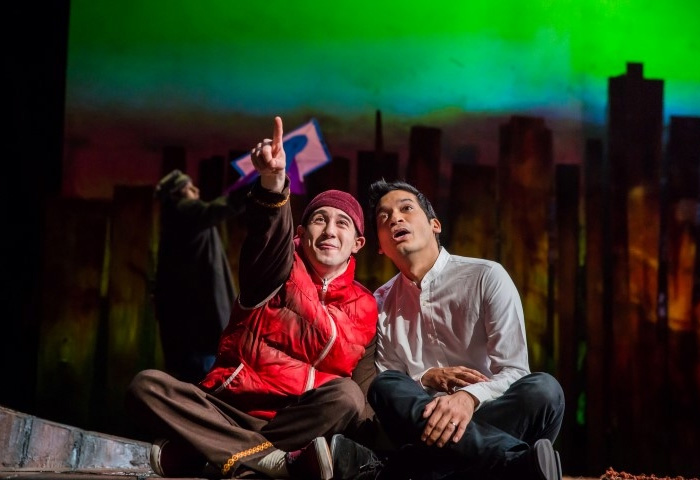Directed by Giles Croft
Written by Khaled Hosseini
Liverpool Playhouse
27th February – 3rd March 2018
Reviewed by Finvola Dunphy
“Every sin is a variation of theft” proffers Amir’s wealthy Afghan father Baba, played by Gary Pillai in this stage version of Khaled Hosseini’s The Kite Runner.
Set against a backdrop of the fall of Afghanistan’s monarchy, the flight of refugees to Pakistan and the United States and the accession of the Taliban regime, Baba and his family are Pashtuns relishing in a time of relative tranquillity in the mid-1970s in the Afghan capital, Kabul.
Giles Croft’s direction is unexpected, making use of direct audience address to drive this plot-filled story forward, and the set, lighting and projection design is particularly thrilling.
We are lured into the hustle and bustle of Kabul with Hanif Khan’s live atmospheric beats on the tabla. After being introduced to the story by the grown up, American speaking version of Amir, played by Raj Ghatak, we are transported to his childhood and his dedicated friendship with Hassan, son of the family’s servant, who is a Hazara.
We are made aware of ethnic tensions early on, but there is something unusually cordial about the political differences in Amir’s residence, where both Pashtun and Hazara live in contentment.
Of course, it is refreshing to see that the relationship between Amir and Hassan is completely devoid of political distinctions and instead focused on a love of kite flying and kite fighting. The large kite-shaped gauzes that were lowered on and off stage began to have significance.
We witness the thrill of this traditional Afghan sport when Amir tries his luck one last time to make his father proud by winning the competition.
Suddenly the stage came to life with a sea of kites and noises from the Schwirrbogen, a large sort of wooden football rattle that mimicked the sound of the wind beneath the airborne kites. The excitement was audible from the audience and made the dark scenes that followed even more poignant.
Poor Hassan, played expertly by Jo Ben Ayed, undergoes a traumatic ordeal from a sadistic older boy, Assef, played menacingly by Soroosh Lavasini.
Assef is a clear example of a child absorbing adult issues like a sponge, acting on things they have no real comprehension of and adopting a taste for violence that relates to tensions beyond their own existence.
Guilt ridden Amir requests that his father get rid of Hassan and his father as servants of their home. Hosseini in the novel, makes this scene one of the most tense and volatile, which didn’t translate on stage, but the utter silence in the packed auditorium hinted at the trepidation of things to come.
After Amir and Baba escape to Pakistan, to avoid the Soviet Union military intervention in Afghanistan, they end up in 1980s California, where the hip, modern culture seems stark and crude compared to the humility of Kabul life.
The large picket set piece that once were trees in Act One now appeared as vast sky scrapers. Events that were to unfold in that city were translated brilliantly, the woman sitting next to me produced a packet of tissues at one point. Enough said.
The use of physicalized movement in this production, as well as lighting and design, was second to none and each and every actor resonated with their engrossed audience.
A standing ovation at the end was the all that was needed to pay homage to this great Afghan-American writer Khaled Hosseini.
